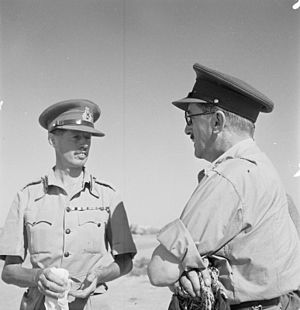Eric Dorman-Smith | |
|---|---|
 Eric Dorman-Smith (left) talking with General Sir Alan Brooke at El Alamein, Egypt, August 1942. | |
| Other name(s) | Eric Dorman O'Gowan |
| Nickname(s) | "Chink" |
| Born | 24 July 1895 Cootehill, County Cavan, Ireland[1] |
| Died | 11 May 1969 (aged 73) Cavan General Hospital, Lisdarn, County Cavan, Ireland |
| Buried | Kilcrow, Cootehill, County Cavan, Ireland |
| Service | Irish Republican Army |
| Years of service | 1914–1944 |
| Rank | Brigadier[1] |
| Service number | 8427 |
| Unit | Northumberland Fusiliers |
| Commands | 1st Battalion, Royal Northumberland Fusiliers Staff College, Haifa 160th Infantry Brigade 3rd Infantry Brigade |
| Battles / wars | First World War Irish War of Independence Second World War |
| Awards | Military Cross Mentioned in dispatches (5)[1] |
| Relations | Reginald Dorman-Smith (brother) |
Brigadier Eric Edward "Chink" Dorman-Smith (24 July 1895 – 11 May 1969), who later changed his name to Eric Edward Dorman O'Gowan, was an Irish officer whose career in the British Army began in the First World War and closed at the end of the Second World War. In the 1950s, Dorman-Smith (then Dorman O’Gowan) became an officer in the Irish Republican Army (IRA).
In the 1920s, during the interwar period, he was one of the military thinkers in various countries, like Heinz Guderian in Germany and Charles de Gaulle in France, who realised that technology and motorisation were changing the way that wars and battles were fought. Influenced by J. F. C. Fuller, Archibald Wavell, B. H. Liddell Hart, and many others, Dorman-Smith tried to change the culture of the British Army and held a number of teaching and training roles in various parts of the British Empire. Although he made several contributions in advisory roles during the campaigns in the Western Desert from 1940 to 1941, it was not until May 1942 that he went on active service again. His service in the Second World War is shrouded in controversy and ended when he was fired from his command in August 1944.
- ^ a b c "British Army officer histories". Unit Histories. Retrieved 25 October 2017.